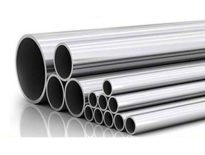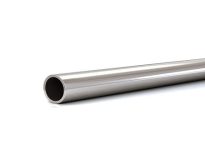Nickel-chrome-based Inconel has excellent corrosion resistance, oxidation resistance, strength under high temperatures, and creep resistance. Due to two reasons, Inconel can tolerate high temperatures and severely corrosive conditions. Because of the passivation layer that occurs when Inconel is heated, it possesses excellent corrosion resistance. Inconel alloys are designed for applications ranging from hot segment power plants to ocean depths well drilling because of these two features.
Types of Inconel
Inconel 600
Inconel 600 Tubes is an alloy that’s really good at handling heat, corrosion, and all the other things that can wear down your machine. It’s great for high-temperature environments like boilers, heaters, and gas turbines, and it doesn’t crack or lose its strength even at low temperatures.
Inconel 601
Inconel 601 offers excellent high-temperature oxidation resistance, carbonization resistance, and mechanical properties at both room and high temperatures. It also resists stress corrosion cracking due to controlled carbon content and grain size. With high creep rupture strength, it is ideal for applications above 500°C.
Inconel 601GC
The Inconel 601GC (Grain-Controlled Inconel 601) is a grain-controlled version of Inconel 601.
Inconel 617
Inconel 617 is a nickel-chromium-cobalt-molybdenum alloy known for its excellent mechanical properties and high-temperature corrosion resistance, including oxidation and carbonization.
Inconel 625
Inconel 625 offers excellent corrosion and oxidation resistance, along with strong tensile and fatigue properties across a wide temperature range up to 980°C. It also provides stress corrosion resistance in salt environments.
Inconel 686
Nickel-chromium-molybdenum-tungsten Inconel 686 is a corrosion-resistant alloy that offers excellent resistance to stress corrosion, pitting corrosion, and combined acid corrosion. Inconel 686 is a corrosion-resistant alloy that is widely utilized in the chemical sector, marine, and poor air quality management.
Inconel 690
Inconel 690 offers excellent resistance to chloride corrosion, high-temperature and high-pressure water stress corrosion, strong oxidizing media, and HNO2-HF mixed corrosion. It is commonly used in nuclear waste treatment plants, steam generators, and nitric acid-resistant parts.
Inconel 718
Inconel 718 is a precipitation-hardening nickel-chromium-iron alloy with niobium and molybdenum. It offers high strength and good toughness at temperatures below 650°C. This alloy is resistant to corrosion in both low and high-temperature environments. It can be delivered in solution-treated or precipitation-hardened states.
Inconel 725
Inconel 725 is a nickel-chromium-molybdenum-niobium alloy known for its excellent corrosion resistance and stress corrosion cracking resistance. Aging heat treatment significantly enhances its strength, ductility, and tensile strength.
Inconel 740H
Inconel 740H achieves age hardening through the precipitation of gamma primary and secondary phases. This alloy exhibits excellent high-temperature strength at temperatures up to 850°C. Its high chromium and cobalt content provides superior oxidation, carbonization, and vulcanization resistance at elevated temperatures.
Inconel X-750
Inconel X-750 offers good corrosion and oxidation resistance, along with strong performance up to 980°C. It also maintains good low-temperature properties and molding capabilities. This alloy is primarily used for aerospace components and industrial gas turbines.
Inconel 751
Inconel 751 is a precipitation-hardening superalloy similar to Inconel alloy 750. It offers excellent wear resistance, strength, and corrosion resistance, along with hot hardness at high temperatures. It is primarily used for exhaust valves in internal combustion engines.
Inconel 783
Inconel 783 is an oxidation-resistant superalloy designed for turbine applications, featuring a low coefficient of thermal expansion. Enhanced with niobium and aluminum, it gains increased strength through precipitation hardening. The alloy’s aluminum content ensures excellent high-temperature oxidation resistance. Additionally, Inconel 783 is about 5% lighter than Inconel 718.
Conclusion
Inconel alloys are essential for demanding applications due to their exceptional resistance to heat, corrosion, and stress. From Inconel 600’s reliability in chemical processing to Inconel 718’s strength in aerospace, each type is engineered for specific challenges. Choosing the right Inconel alloy ensures optimal performance and durability in extreme environments, making it a vital material in industries ranging from aerospace to chemical processing. For tailored solutions, consulting with experts can help select the ideal Inconel alloy for your needs.
FAQs
What are the different types of Inconel?
Inconel alloys are used for extreme environments due to their strength, temperature stability, and corrosion resistance. Key types include 600 for high-temperature oxidation, 617 for high-temperature corrosion, 625 for strength and resistance, 690 for nuclear reactors, 718 for strength, and 750 for superior oxidation resistance.
What is the difference between Inconel 601 and 617?
Inconel 601 offers excellent oxidation resistance and is highly resistant to chloride-ion stress-corrosion cracking and caustic corrosion. In contrast, Inconel 617 provides outstanding metallurgical stability, strength, and oxidation resistance, particularly in high-temperature environments.
What is 718 Inconel?
Inconel 718 is a precipitation-hardenable nickel-chromium alloy with significant amounts of iron, niobium, and molybdenum, and smaller quantities of aluminum and titanium. It is known for its high strength, corrosion resistance, and excellent performance at elevated temperatures.


